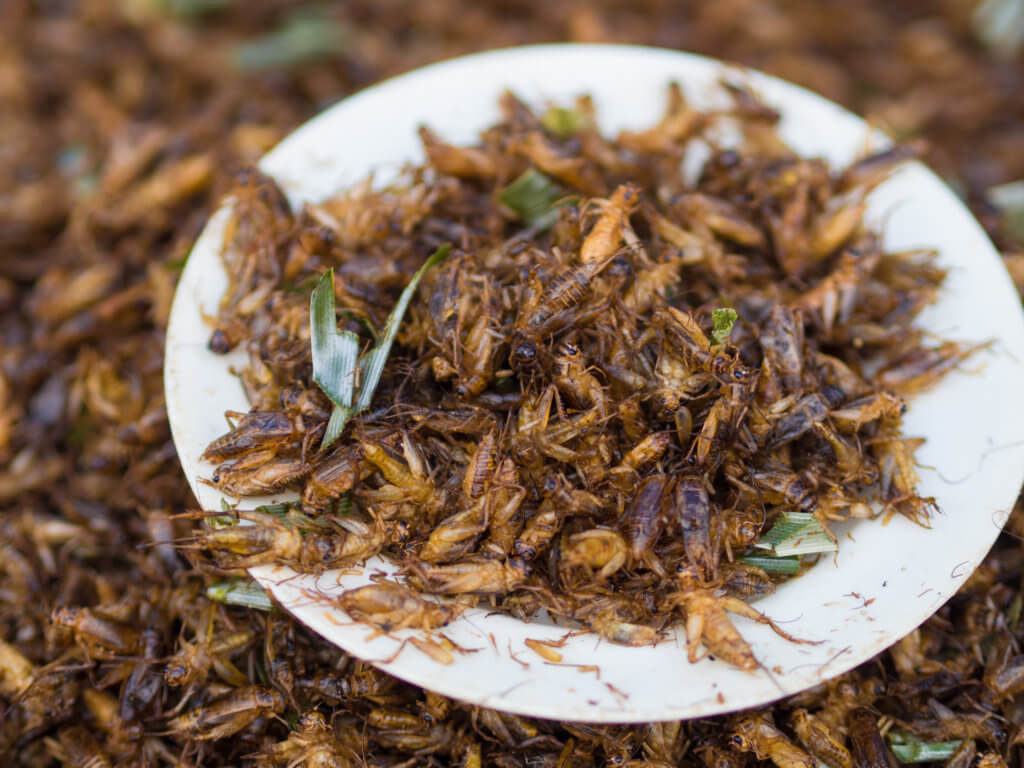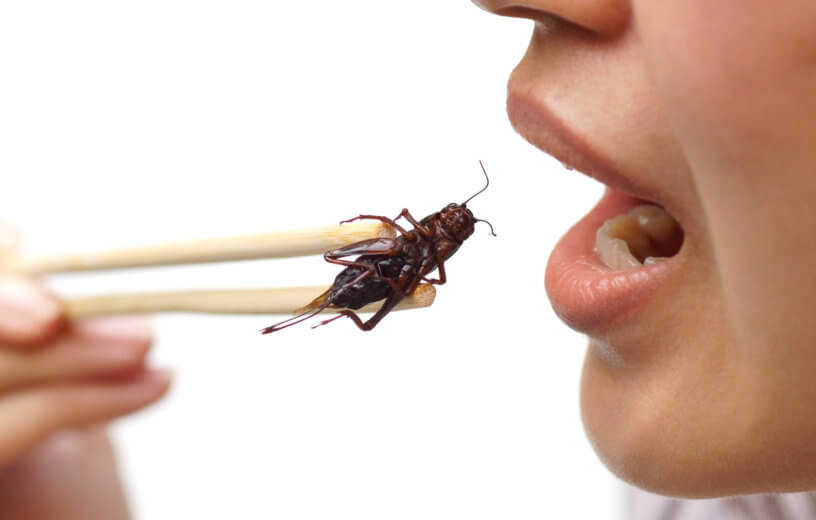FORT COLLINS, Colo. — The notion of eating insects is enough to make many Americans lose their appetite, but researchers from Colorado State University argue bugs are actually a smart choice for dinner. Scientists report both the chitin (kai’tin) and healthy fats gained by eating insects appear to contribute to healthy gut microbiota and provide plenty of essential protein and nutrients.
Tiffany Weir, an associate professor in CSU’s Department of Food Science and Human Nutrition, author this research in collaboration with the University of Wisconsin’s Valerie Stull. The pair have been researching the effect of cricket consumption on gut microbiota for years.
Prof. Weir explains their earlier research helped spawn Weir’s latest work, which focused on how cricket-derived chitin (a cellulose-like biopolymer widely distributed throughout nature) in designer chocolate patties may increase positive prebiotic effects among people with irritable bowel syndrome (IBS).
“Edible insects and insect fibers may be unusual in the American diet, but they are commonplace around the globe, as insects are part of many traditional cuisines,” Stull says in a university release. “They are gaining attention as an environmentally friendly source of animal protein.”
Moreover, according to a prior study referenced by researchers, eating insects is quite common on a global scale; 3,000 ethnic groups in 130 countries eat insects mostly harvested from the wild. However, insect farming is also beginning to grow in popularity as it uses less resources (water, land, feed) and emits fewer greenhouse gases.

“Although reduced environmental impacts of insect rearing compared to traditional livestock have been a key selling point for insect-based products, there are also underexplored and under-appreciated nutritional benefits,” Prof. Weir comments. “Insects are touted as a good source of protein, but the fiber component, chitin, is not found in other animal foods, and the omega-3 content may be higher than what is found in many plant foods. These components may provide unique benefits for the gut by encouraging healthy gut microbiota and reducing intestinal inflammation.”
Study authors explain this latest report is a perspective piece summarizing current knowledge on the topic of insect consumption and highlighting any relevant gaps in related research.
What did the researchers find out about eating insects?
- The varieties of insects eaten in areas where roughly two billion people live include beetles, caterpillars, wasps, bees, ants, grasshoppers, true bugs, and termites.
- While nutrition varies from bug to bug, in general, insects appear to be a reliable source of bioavailable animal protein that also contain all essential amino acids necessary for human nutrition, especially among those in cereal and legume-based diets.
- There have been studies focusing on the potential risks of insect consumption, such as allergens and contaminants, but there is little evidence entomophagy (eating insects) presents a larger risk to consumers than other animal food sources like chicken or beef.
- Recent studies show human cell types produce enzymes to break down chitin, facilitating absorption during the digestion process.
- Weir and Stull’s previous study found that 25 grams of cricket powder ingested on a daily basis displays a connection to an increase of beneficial bacteria in the intestines. Still, authors caution more research is necessary.
- Insect consumption has the potential to positively influence global challenges of malnutrition, while simultaneously lowering the risk of disease and world food shortages.
- Promising evidence regarding the impact of insects/chitin on gut health should be tempered by study limitations. Thus, researchers call for large, well-controlled human studies among deliberate, targeted populations.
“Low-cost insect farming could help vulnerable communities meet their nutritional needs and improve food security, especially in contexts where entomophagy is already practiced,” the study authors conclude. “Not only are insects generally an environmentally friendly animal protein source requiring fewer resources than conventional livestock, but some species are also adept recyclers that can consume and convert low-value organic byproducts and wastes, including food waste, into nutritious, high-quality food or animal feed.”
The study is published in Nature Food.
You might also be interested in:
- Crickets for dinner? Not if you have a shellfish allergy, scientists discover
- Improve your digestive health by eating crickets every day, study says
- Insects for dinner? 58% can see a future where bugs replace beef


Put ’em on the shelves, mildly advertise them and shut up about it. Don’t use the techniques you do to push perv sex.
Until I run our of Deer, Elk, Fish, Bear, Antelope, Wildebeest, or maybe even Sasquatch.. I will NEVER east bugs! I dunno what kind of whack job even came up with eating bugs. It’s BEYOND disgusting.
BIBLICALLY, only a few species of LOCUSTS are permissible. Other insects are Biblically forbidden to eat.
Bugs contain parasites that are not always killed by various preparations for safe consumption.
That’s what I had heard, too…. wonder why they never mention that?
And also bacteria?
Just proves you can fund a study to produce whatever results you want. This is propaganda to normalize you eating bugs, when the human system does not tolerate bugs. The World Economic Forum is involved with this study.
This is ridiculous. Stop pushing people to eat bugs. Very few people, if any, are willing to do this, and why should they? I spent 20 years of my life as a vegetarian, abstaining from all animal flesh, and even living without dairy or eggs for about five of those years, and was perfectly healthy, as were my growing children, without any need to consume insects in order to get sufficient protein. Even globalist Bill Gates has enough sense to understand that, not only are people unwilling to eat bugs, most aren’t even willing to give up meat in favor of plant-based proteins.
Globalists and their sheep followers should be the only ones pushed into eating bugs. I would only eat one accidentally.
Read this:
https://newrealities.medium.com/is-eating-insects-safe-the-hidden-dangers-of-insect-consumption-5b86daa65ea3